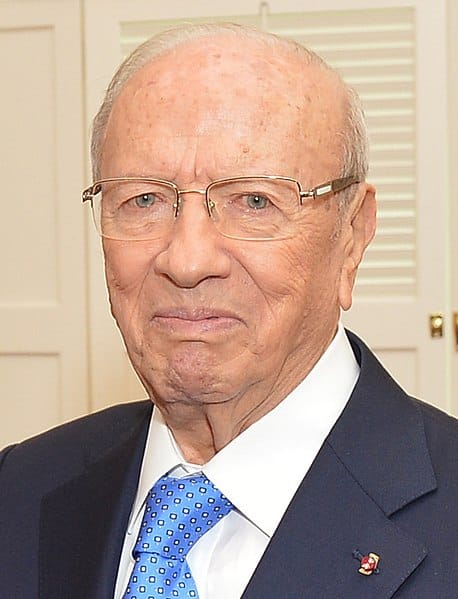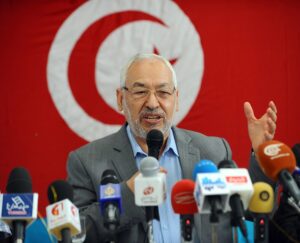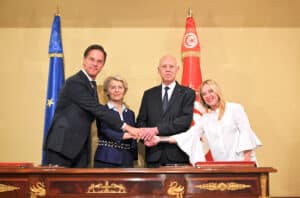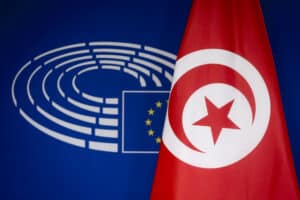On the 25th of July, Tunisia’s first democratically elected president, Beji Caid Essebsi, passed away at the age of 92, leaving the country to find a new successor. Condolences poured in from neighbouring countries as well as Western heads of state. German Chancellor Angela Merkel, Italian premier Giuseppe Conte, and French President Emmanuel Macron, who will attend the funeral, expressed their esteem for Essebsi. Former Tunisian President Moncef Marzouki, one of Essebsi’s firmest opponents, mourns the president and calls it “a sad day”, but also shows his pride over the smooth political transition. In a statement published on Facebook, Ettakatol, the Democratic Forum for Labours and Liberties, expressed their respect for the deceased president and their condolences to the family. They urge the authorities to find a quick solution to overcome the critical stage after the president’s death, particularly in the absence of a constitutional court, and to act in the interest of all the people.
Mohamed Ennaceur sworn in as interim president
Mohamed Ennaceur, the head of parliament, was sworn in as an interim leader in a ceremony after Essebsi’s death on Thursday. Until the next presidential elections on September 15th – they were originally scheduled for November 17th but were brought forward due to the president’s death – he is the head of the country. Essebsi died in the hospital after several recent hospitalizations due to his fragile health.
Concerns of a power vacuum prior to the presidential elections are growing in Tunisia since Essebsi’s hospitalization. In the case of the president’s inability to accomplish his responsibilities, the country’s constitution offers two possible solutions: either the prime minister takes over the president’s duties for a maximum of 60 days, or the speaker of the parliament takes on the job for up to 90 days. Whether the first or the second option is chosen is usually decided by the constitutional court. However, no such court has been established in Tunisia since the Arab Spring, challenging the legitimacy of Ennaceur’s interim presidency.
Bill concerning the electoral law stirs controversy
Another issue that might stir some controversy is a bill prohibiting the eligibility of some of the aspiring presidential candidates. Among those potentially excluded candidates is Nabil Karoui, prime minister Chahed’s main rival and the leading candidate for the elections according to a June poll. After the poll revealed Karoui’s lead over Chahed, hasty action was taken to pass the bill from the parliament to the president. However, Essebsi passed before signing or rejecting the change of the electoral law.
It is unclear whether Ennaceur will push through the controversial law. Youssef Cherif, political analyst and member of the Carnegie Endowment for International Peace, said that he doubts that Ennaceur will ratify the bill. “In the absence of a Constitutional Court, my guess is that we’ll enter the elections under the old eligibility laws,” which is likely to result in the Karoui’s victory in the presidential elections, according to Cherif.
Among the other aspirants for the presidential office is also Mounir Baatour, the first openly homosexual candidate. Essebsi’s son Hafedh Essebsi, leader of the secular Nidaa Tounes Party (Monastir faction), allegedly plans on participating in the elections as well.
Some observers are uncertain concerning the stability of Tunisia’s democracy, considering that it is very young. In addition, Tunisia recently faced high unemployment and several Islamist terrorist attacks. The disparity of economic and political progress is frustrating for a large part of the population and weakens their trust in political institutions, as they do not believe that the current political parties can solve the crisis. Since 2016, Prime Minister Chahed repeatedly promised that tackling the economic crisis is a priority, however, no positive change has occurred yet. In contrast, unemployment has increased from 10 percent in 2010 to 15 percent, due to weak growth, low investment, and a decline in tourism after the 2015 terrorist attack. Youth unemployment is especially high among university graduates, and Tunisia’s GDH is at a low of only 1.1%. Thus, turn-outs in the upcoming elections are feared to be low.
Tunisia is proud of smooth transition
Despite the challenges Tunisia faces, the people are proud of the “smooth political transition” and the country has received praise for its stability after the president’s passing. Local journalist Zied Krichen claims that people are proud that “there will not be a vacuum in this young democracy […] The country has a new president in a short time today.”
According to political analyst Ibrahim Ouslati, unrest following the president’s death is unlikely: “I don’t think there will be any problem because Tunisians have a constitution that clearly shows that the speaker of the parliament occupies the position temporarily.” Moreover, he believes that the political elite has “enough awareness” to handle the transition in a democratic fashion.
Journalist David Charter also maintains that “the constitution has already managed to ensure a stable transfer of power” and that the quick decision on the interim president is Essebsi’s legacy.
In the end, Essebsi’s successor can either continue his progressive and democratic path or introduce a setback with renewed autocratic tendencies
Sources: The National The Arab Weekly Aljazeera Aljazeera ll Al-Monitor DW Reuters Tagesspiegel FAZ
Picture: Wikipedia



